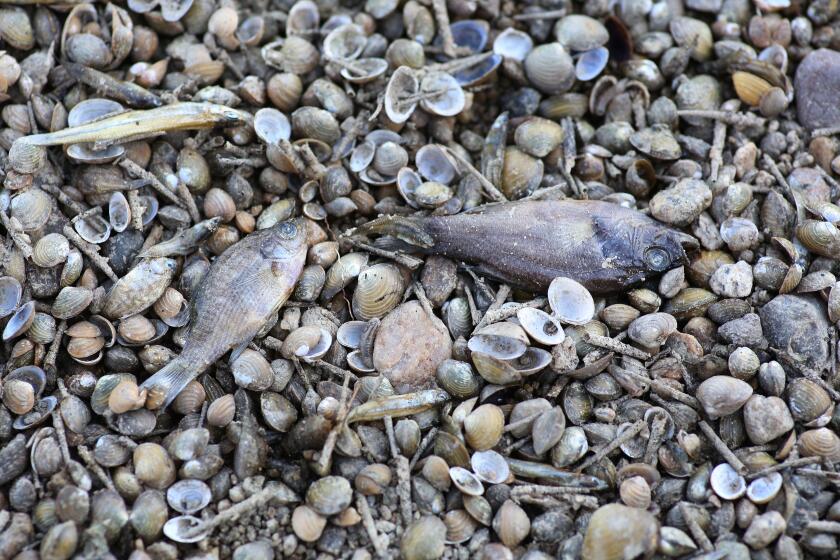A new record
WITH a new world-record category for fish, it’ll always be about the one that got away.
The International Game Fish Assn., which is the keeper of the world’s fishing records, voted to grant titles to fishermen, provided they release their record hauls in healthy condition. Each record will be based on the length -- not weight -- of a fish.
For the record:
12:00 a.m. Sept. 29, 2005 For The Record
Los Angeles Times Thursday September 29, 2005 Home Edition Main News Part A Page 2 National Desk 1 inches; 66 words Type of Material: Correction
Record fish -- An article in Tuesday’s Outdoors section about fishing records said Mark Gasich holds the world record for yellowfin tuna. The 399.6-pound fish he caught is the biggest yellowfin taken by rod and reel, but the International Game Fish Assn. has not officially recognized the catch as a record. The article also referred to Ralph Werking, a holder of fishing records, as Raleigh Werking.
For The Record
Los Angeles Times Tuesday October 04, 2005 Home Edition Outdoors Part F Page 3 Features Desk 1 inches; 66 words Type of Material: Correction
Record fish -- An article in last week’s section about fishing records said Mark Gasich holds the world record for yellowfin tuna. The 399.6-pound fish he caught is the biggest yellowfin taken on rod and reel, but the International Game Fish Assn. has not officially recognized the catch as a record. The article also referred to Ralph Werking, a holder of fishing records, as Raleigh Werking.
The decision replaces images of hooks embedded in mammoth sharks or tuna with a kinder, gentler approach long advocated by animal activists, though top anglers have mixed reactions. The change will lead to an entirely new class of fishing records and will affect anglers whose quarry includes panfish, trophy bass and yellowtail.
“For the first time in our 67-year history, the IGFA would be adding a category for recording angling achievement that requires the live release of game fish,” said association president Rob Kramer.
The change is driven by concern for the ocean’s depleted fisheries. Historically, anglers pursuing big fish haul their catch into boats using nets, gaffs or ropes. Existing rules require weighing the fish on land, but because most boats are unable to keep fish alive, the animal often dies en route to the scales. In the end, the angler gets a photograph, an accurate weight and possibly a place on the pages of fishing immortality. The fish usually gets sent to the freezer or hung on a wall.
Under the new rules, the angler can submit a measurement of the length of the fish, instead of its weight. The IGFA will consider counting it as a record provided the fish was returned to the water and swam away in good health.
The change marks the biggest shift in how big fish are taken and measured since the association began keeping records in 1939. The organization’s governing board approved the change in July but left it to its staff to develop specific rules, including how to confirm fish lengths, which are expected to take effect next spring.
Among the details to sort out are whether boat crews can use ropes, slings and rubberized nets to hoist a fish out of the water momentarily for a measurement. No gaffs allowed. The measuring device likely to be used is an IGFA-approved measuring board.
Conservationists and fisheries managers say the change is overdue and will help protect fish.
“I can’t see a downside to it,” says Marty Golden, Pacific recreational fisheries coordinator for the National Oceanic and Atmospheric Administration. “I think that this whole idea is a great way to promote catch-and-release fishing.”
An international team of scientists reported in the July issue of the journal Science that the variety of tuna, marlin, swordfish and other big ocean predators has declined up to 50% over the last half-century as a result of overfishing. While much of that is due to commercial harvests, other studies have shown that sportfishing can affect localized species, such as rockfish.
“Every day it gets harder and harder to break a world record,” says Ralph Werking, a Florida resident and holder of 61 records. “The fisheries are being depleted faster than they can replenish themselves.”
Rebecca Reynolds of Dania Beach, Fla., who holds 46 world records, favors the change in the rules.
“I think that most recreational anglers practice CPR [catch, photo and release] for the most part,” Reynolds says. “There are many world-record catches that are released just for the fact that they do not want to harm the fish.”
But not all anglers are pleased.
“It’s totally bogus. You can’t get an accurate measurement from a live fish,” says McGrew Rice, captain of the Ihu Nui, based in Kona, Hawaii. He says writhing, thrashing fish are exceedingly difficult to measure and can harm people who handle them.
For example, Rice says injuries to anglers and deckhands are common on boats that target billfish. Last year, he recalls, someone was fatally speared by a marlin as the victim and another man tried to kill it.
“They were trying to kill the fish, and the fish got him,” Rice says. Imagine the danger, he adds, for someone who has to cozy up to the fish with a measuring device, instead of from a safe distance at the end of a long club.
Mark Gasich, holder of the all-tackle world record for yellowfin tuna, a 399.6-pound brute, says destroying a fish may be the only way to subdue it to ensure an accurate measurement of its length.
Moreover, some fish, such as white seabass, may never be suitable for measurement because they are fragile and die after limited handling or time out of the water.
Martin Arostegui of Coral Gables, Fla., has set 97 world records on fly-fishing tackle. He approves the change but wonders how a reported length can be documented.
“Let’s say that I am the world records’ administrator and you catch a fish and send me a picture,” Arostegui says. “I’ve got to be able to determine that the size that you tell me the fish is, it is correctly that size by the picture.”
Some anglers question whether an accurate measurement of a fish’s length means anything. While some long fish are skinny, others are robust. Weight can vary significantly regardless of length. For many anglers, the length-record fish will never have the same gravitas as the weight-record fish.
More to Read
Sign up for Essential California
The most important California stories and recommendations in your inbox every morning.
You may occasionally receive promotional content from the Los Angeles Times.










